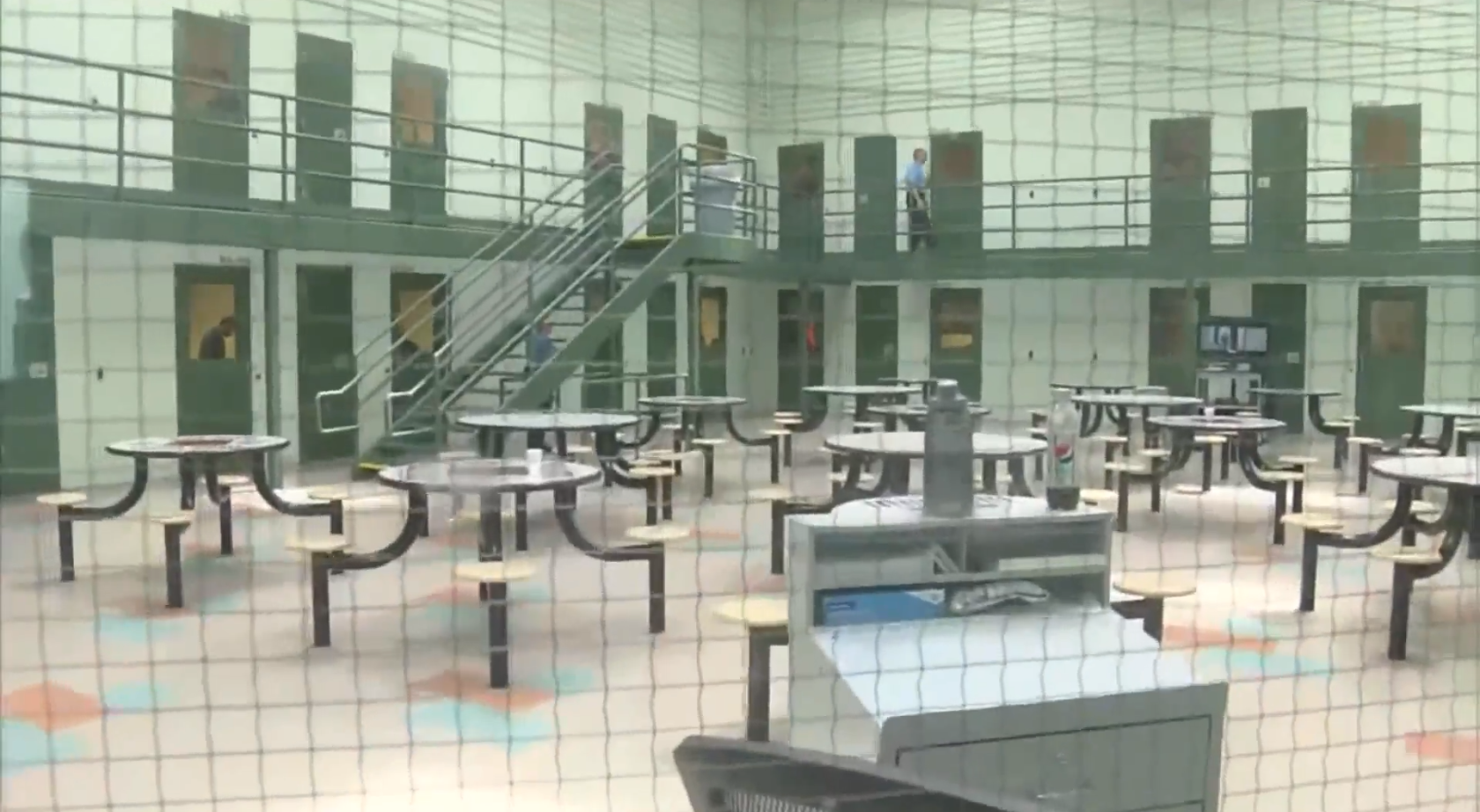
Fox31

Audio By Carbonatix
During the first weeks of the COVID-19 pandemic, the Aurora Contract Detention Facility, which houses Immigration and Customs Enforcement detainees, saw a few staffers test positive for the coronavirus. It wasn’t until mid-May that a handful of detainees at the facility, which is run by private-prison company GEO Group through a contract with ICE, tested positive for the virus.
By the beginning of August, a total of 24 detainees had tested positive. That number continued to rise slowly but steadily, largely because of new arrivals, the facility’s warden told Congressman Jason Crow‘s office, according to an August 26 inspection report. The September 23 report by Crow’s office noted that 51 detainees had tested positive overall.
Then something changed: Internal spread among detainees who’d already been housed at the facility, not from new arrivals, led to over twenty positive tests in a week; the September 30 report listed 73 total cases. But that outbreak appeared to be under control, because two weeks later the tally had only grown to 77.
As of October 22, however, the number of overall cases is at 110 over the course of the pandemic, with 39 confirmed positives currently “under isolation or monitoring,” according to the ICE website. Additionally, at least 22 staffers have tested positive for the coronavirus throughout the pandemic.
These rising numbers at the Aurora detention facility have immigrant-rights advocates, lawyers and medical professionals concerned.
“There’s an ongoing outbreak at the facility,” Carlos Franco-Paredes, an infectious-disease doctor associated with the University of Colorado Anschutz Medical Campus, said during an October 26 virtual press conference advocating for the release of detainees, particularly medically vulnerable detainees, from the facility. “There’s not really any other way to protect them.”
Detainees housed at the Aurora ICE facility are a mix of undocumented immigrants with and without criminal charges and/or convictions, legal immigrants with criminal convictions, and asylum seekers. The facility also houses dozens of U.S. Marshal detainees on any given day.
Earlier this month, Westword spoke with an ICE detainee who asked that his name not be used for fear of retaliation. He described how he was isolated in his own cell for his first fourteen days at the facility; after that, he was moved to the general population and eventually wound up in a warehouse-style dormitory with about thirty detainees. That’s where a major outbreak occurred. All of his dormmates were finally tested, and the vast majority of the tests, including his own, came back positive for the coronavirus.
ICE put the fourteen-day isolation protocol for new arrivals into place earlier this year as a way to prevent COVID-19 from spreading into the facility. The center’s population was already declining at the time.
Exactly a year ago, the facility housed 1,042 ICE detainees. At the beginning of March, the facility had 607 ICE detainees. As of mid-October, the facility had 308 detainees, a number that local ICE leadership has told Crow’s office it achieved through a combination of humanitarian parole and releasing individuals using alternatives to detention methods.
Advocates with the Colorado People’s Alliance, the group that organized the press conference, are now pushing local ICE officials to continue releasing detainees on humanitarian parole.
Immigration attorneys have also pushed for bond hearings and, in some cases, have filed lawsuits to get their clients out of the facility. Some of those lawsuits led to detainees being released, while others were dismissed by judges in the U.S. District Court of Colorado.
Aside from isolating new arrivals, the warden also temporarily locked down the facility earlier this month to control the COVID-19 outbreak, leading to a multi-week delay for hearings at the immigration court located there.
But even with these mitigation efforts in place, detention facilities are inherently unequipped to deal with a highly infectious disease like COVID-19, according to Franco-Paredes. “Because of poor ventilation, crowding, people being close to each other, it’s just basically a challenge to be able to protect these populations,” he said.
Adrienne Benavidez, a Democratic state representative from Adams County, is worried about the rising positivity rate in her county, combined with the ongoing outbreak at the ICE facility. “This is a humanitarian crisis that we need to address,” she said during the press conference.
“We’re really seeing the fruition of negligence of the facility and, honestly, incompetence in managing the COVID-19 pandemic,” added Danielle Loeb, a doctor associated with the University of Colorado School of Medicine who has been advocating for the release of ICE detainees from the Aurora facility.
The Tri-County Health Department has been advising the facility’s leadership on managing outbreaks.
“TCHD provided GEO recommendations on options for testing detainees and staff to control the current surge in cases,” explains Bernadette Palmieri, an epidemiologist with Tri-County, declining to share details because it’s an “active investigation.”
During the press conference, however, Benavidez revealed that when she spoke with Dr. John Douglas, the executive director of Tri-County Health, on October 23, he told her what the department is recommending.
“He had indicated he’s trying to convince them to do what he called ‘universal testing’ to have everyone in the facility – all of the detainees and all of the staff – tested,” she reported. “Because until you really do that and can truly isolate people and give them the medical care they need, this is never going to be resolved.”
Alethea Smock, a local spokesperson for ICE, says that the facility has agreed to offer another round of testing to all detainees. In addition to testing new arrivals, she notes that the center did a first round of all-detainee testing in June.